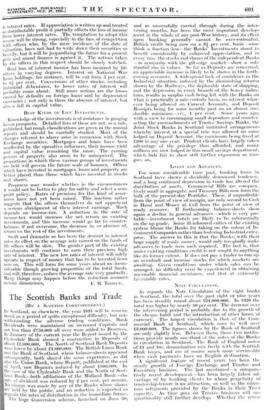The Scottish Banks and Trade
(BY A SCOTTISH CORRESPONDENT.)
IN Scotland, as elsewhere, the year 1931 will be remem- bered as a period of quite exceptional difficulty, but not- withstanding the adverse trading conditions, Bank Dividends were maintained on increased .Capitals and not less than £750,000 all over were added to Reserves. In January of the current year the Report issued by the Clydesdale Bank showed a contraction in. Deposits of about £2,000,000. The North of Scotland Bank Deposits were loWer by about £1,000,000. The British Linen Bank and the Bank of Scotland, whose balance-sheets appeared subsequently, both shared the same experience, as did also the Union Bank, whose Report, published at the end of April, saw Deposits reduced- by about £800,000. In the case of the Clydesdale Bank and the North of Scot- land Bank—both affiliations of the Midland Bank—the rate of dividend was reduced by 2 per cent. per annum. chan_ge was made by any of the Banks whose shares are held by-the public, and no reductiOn is "expected as gards the rates- of distribution in thc• immediate future. The huge Conversion scheme, launched on June 30, and so successfully carried. through during the inters veiling months, has been the most important develop- ..ment. in the whole of our post-War history, and its effect . upon . banking generally cannot be over-estimated. . British credit being now on a 3} per cent. basis—sonic think a fraction less—the- Banks' Investments stand to benefit considerably by enhanced appreciation, and in every case the stocks and shares of the independent Banks —m sympathy with the gilt-edge market—show a sub- stantial rise in values. So far as Deposits arc concerned, an appreciable increase is likely to he shown in the forth- coming accounts. A widespread lack of confidence in the Industrial situation, induced by the diminishing returns shown by the Railways, the deplorable state of shipping, and the depression in every branch of the heavy indus- tries, results in surplus cash being left with the Banks on what is practically a safe-custody basis, no interest what- ever being allowed on Current Accounts, and Deposit Receipts being for some months past on an almost irre- ducible minimum—viz., 1 per cent. Sonic years ago, with a view to encouraging small depositors and counter- acting-the encroachments of Trustee Savings Banks, the Joint Stock Banks in Scotland instituted arrangements whereby interest at a special rate was allowed on sums lodged on Deposit Account, the maximum being fixed at 1200 in any one year. Prudent clients have largely taken advantage of the privilege thus afforded, and ninny millions are now lodged in this small savings department, which bids fair to show still further expansion as tinge goes on.












































 Previous page
Previous page